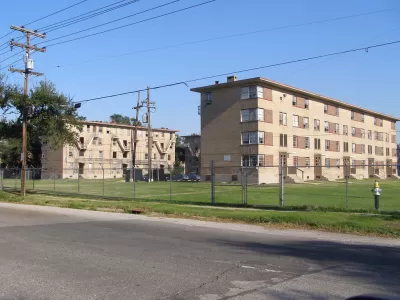Seeking repeal of the Faircloth Amendment could be a needless distraction in the new administration's efforts to create more affordable housing, according to an article by Jenny Schuetz for the Brookings Intitution.

In a piece published by the Brookings Institute, Jenny Schuetz argues that recent efforts by housing activists to repeal the Faircloth Amendment—a rule that limits the construction of public housing—are a distraction from the "more tangible obstacles to low-cost housing." Schuetz lists four reasons why public housing isn't the cure-all answer to the current housing crisis and suggests some effective ways to promote affordable housing.
- Local zoning that prohibits multi-family housing won't be affected by a repeal of the Faircloth Amendment. Without addressing zoning issues, public housing will remain segregated in areas with less political power and fewer resources.
- Many public agencies don't have the expertise or resources to manage large construction projects. "Today, nearly all new subsidized housing is built and managed by specialized nonprofit or for-profit developers. So, despite those calls for 'the government' to build more housing, most housing authorities don’t have the capacity or the desire to undertake new construction projects."
- Housing stock needs a long-term commitment to care and maintenance. Absent a long-range plan for funding maintenance and upgrades, public housing will fall into disrepair and place additional burdens on the low-income families who inhabit it.
- Other housing subsidies work better than building new public housing. Because subsidized housing tends to cost more to build than market-rate housing due to the complexity of the process, "increasing funds for housing vouchers or for the acquisition and rehabilitation of existing apartments" and "shoring up the long-term physical and financial viability of existing subsidized properties" would be more cost effective.
Schuetz acknowledges that making housing more affordable should be a priority of the Biden administration, but asserts that advocates should focus on more effective avenues for change than public housing.
FULL STORY: Four reasons why more public housing isn’t the solution to affordability concerns

Planetizen Federal Action Tracker
A weekly monitor of how Trump’s orders and actions are impacting planners and planning in America.

Maui's Vacation Rental Debate Turns Ugly
Verbal attacks, misinformation campaigns and fistfights plague a high-stakes debate to convert thousands of vacation rentals into long-term housing.

Cuomo Is the Candidate of Both NIMBYs and Developers. What Gives?
In the New York City mayoral race, odd bedfellows align to preserve the housing status quo.

The Subversive Car-Free Guide to Trump's Great American Road Trip
Car-free ways to access Chicagoland’s best tourist attractions.

San Antonio and Austin are Fusing Into one Massive Megaregion
The region spanning the two central Texas cities is growing fast, posing challenges for local infrastructure and water supplies.

Charlottesville Temporarily Has No Zoning Code
A judge ordered the Virginia city to throw out its newly revised zoning code, leaving permitting for new development in legal limbo.
Urban Design for Planners 1: Software Tools
This six-course series explores essential urban design concepts using open source software and equips planners with the tools they need to participate fully in the urban design process.
Planning for Universal Design
Learn the tools for implementing Universal Design in planning regulations.
Heyer Gruel & Associates PA
JM Goldson LLC
Custer County Colorado
City of Camden Redevelopment Agency
City of Astoria
Transportation Research & Education Center (TREC) at Portland State University
Jefferson Parish Government
Camden Redevelopment Agency
City of Claremont





























